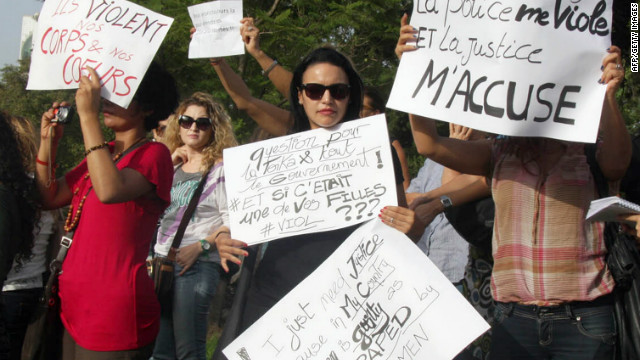
Outraged Tunisians took to the streets by the hundreds
Tuesday, angrily protesting the treatment of a woman who was allegedly raped by
police officers -- and then charged with public indecency when she filed a
complaint.
"At best, charging the victim of a rape by police
officers instead of protecting her from intimidation and stigma highlights the
deep flaws on Tunisian law and criminal justice system," said Hassiba Hadj
Sahraoui, deputy Middle East and North Africa program director at Amnesty International.
"At worst, it is an insidious attempt to discredit a
rape victim and protect those she accused of raping her."
The case began September 3 when three police officers
approached the woman and her fiance while they were in their car in the capital
Tunis, the woman's lawyer told Amnesty. Two of the officers then raped the
woman inside the car, while the third took her fiance to a nearby ATM to extort
money from him, the woman claimed.
It was only after she filed a complaint against the
officers -- and they were charged with rape and extortion -- that the officers
said they found the couple in an "immoral position" in the car.
"This case first shocked public opinion since the
innocent woman was raped by policemen," said Salah Eddine El Jorshi of the
Tunisian League of Human Rights. "But when the verdict was announced, we
were shocked even more that they tried to take this to another level by
targeting the victim herself." Authorities have not specified what they
meant by "immoral position," but the claim was later repeated by the
country's interior ministry, Amnesty said. The couple was charged with
"intentional indecent behavior," which could yield up to six months
in prison.
Both have denied the charges. Tuesday's session is the
second of what is expected to be several court hearings on the matter. The
decision to charge the woman incensed human rights groups like the Tunisian
League of Human Rights and the Tunisian Association of Democratic Women, who
called for protests outside the Tunis courthouse.
"We fear that the treatment afforded to the young
woman will deter other victims of sexual abuse from coming forward and as they
may fear being treated as the accused rather than the victim," Amnesty's
Sahraoui said.
Because of the case, rights groups are taking a closer
look at the Tunisian government and judiciary.
"This caused a major upheaval in Tunisian public
opinion," Jorshi said. "Some felt that maybe the woman was part of
the crime, but others strongly felt that she was solely targeted because she
was a woman." Tunisia is the birthplace of the Arab Spring, a series of
revolutions that swept across northern African and the Middle East.
On December 17, 2010, Mohamed Bouazizi, a young Tunisian
street vendor, set himself on fire in protest, sparking the movement that still
ripples through the region. Tunisia's revolution ousted President Zine el
Abidine Ben Ali and brought about a new government and political system,
including a new draft constitution.
(CNN)























0 comments:
Post a Comment
We Love To Hear What You think About The Post Or Blog.